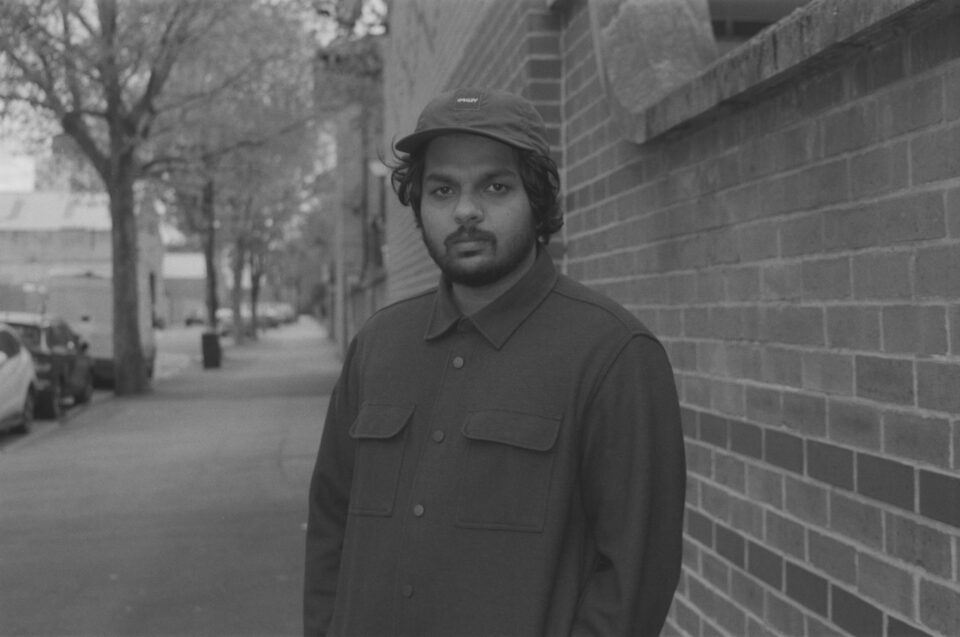A prime debut album fit from Shashwat Bulusu, Fitrat is a fresh blend of shoegaze, indie folk, electronica, and rock, all filtrated under the ample lens of his signature Hindi-Urdu lyricism.
The Vadodara-based artist has been experimenting for over a decade and finally culminated in a full-length album. It feels almost like an uncompromising venture into sound and storytelling. Each song has an additional layer peeled off that increasingly reveals a satirical but aware commentary on masculinity and the hero trope that has become so ingrained in Indian cinema.
Bulusu does not fear to trespass. Fitrat is, essentially a takedown of the so-called male hero that Bollywood has glorified at different points of time. Rather than hailing this figure, Bulusu tears him apart, quite often with biting humor. The seven tracks are more than mere sound; they’re stories that carry the poisonous impulses attached to these film heroes.
The artist says, “The album explores the politics of relationships and toxic behaviors, especially those that come from the trope of the masculine Bollywood hero. In a way, it is a sad joyride documenting the fall of this hero. It made me reflect on my behavior—what masculinity means to me, how I have been coerced and how I have coerced others. It’s uncomfortable, but I wanted to look at these experiences head-on.”


It is clearly evident in tracks such as “Tanashahi” or “Mausam” why Bulusu stands out. In such songs, he is neither the run-of-the-mill indie artist fiddling with a few weird chords nor sounding like any noise rock artist with alternative folk influences and electronic beats. The soundscapes indicate a diversity that’s a wee bit noisier than the people who have been around for much longer than Bulusu, but effortlessly woven together like a full-bodied dark beer cocktail. And then, of course, there are the lyrics. Some tracks are meditative, while others challenge you to make you pause and reflect on the politics that the words are driving at.
A lot of the charm behind Fitrat was how personal it feels. Bulusu produced and performed every element of the record himself from his childhood home in Vadodara. Using Soviet-era microphones that he sourced from a radio collector in Bengaluru for ₹5,000, he transformed a simple home studio into a nursery for creativity. There is something raw, DIY-esque about it, which really goes well with Bulusu’s vibe — he is the kind of artist who thrives on working outside conventional structures.
The result is a seven-track album distilled from 16 songs he wrote between 2021 and 2022. Bulusu’s creative process is as intense as it is organic, with much of the album stemming from a daily writing practice he took up during this time. While some might call this unfiltered, the songs on Fitrat are anything but rough drafts. Each song feels deliberate, like a carefully curated part of a bigger conversation. “Exit-Mynah,” one of the songs that chiefly showcase Bulusu’s talent with the presentation of subversive themes in captivating, almost hypnotic soundscapes, is not only arranged powerfully. He presents feelings of vulnerability and confrontation — as if the musical representation is the reflection of his personal and societal conflicts — in this track.
But what really sets Bulusu apart is that his music isn’t always easy to digest — and that’s a good thing. Artists like him don’t create for the sake of fitting into playlists or staying radio-friendly. Bulusu’s craft sits at a different intellectual level, the kind that requires active listening. You can’t just throw on Fitrat and expect it to wash over you like background music. It’s meant to be dissected, re-listened to, and interpreted.
Listen to ‘Fitrat’ below.






